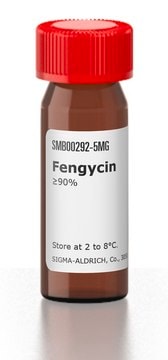About This Item
Recommended Products
biological source
synthetic
Quality Level
grade
FG
Agency
meets purity specifications of JECFA
reg. compliance
EU Regulation 1334/2008 & 178/2002
concentration
50%
refractive index
n20/D 1.566
density
1.107 g/mL at 25 °C
application(s)
flavors and fragrances
Documentation
see Safety & Documentation for available documents
food allergen
no known allergens
Organoleptic
garlic; green; metallic; onion; sulfurous
SMILES string
CCCSSSC
InChI
1S/C4H10S3/c1-3-4-6-7-5-2/h3-4H2,1-2H3
InChI key
ZOYASYRPGHCQHW-UHFFFAOYSA-N
Looking for similar products? Visit Product Comparison Guide
Signal Word
Danger
Hazard Statements
Precautionary Statements
Hazard Classifications
Acute Tox. 4 Oral - Aquatic Chronic 1 - Eye Irrit. 2 - Skin Irrit. 2 - Skin Sens. 1 - STOT SE 1 Inhalation - STOT SE 3
Target Organs
Respiratory system, Upper respiratory tract
Storage Class Code
6.1C - Combustible acute toxic Cat.3 / toxic compounds or compounds which causing chronic effects
WGK
WGK 3
Flash Point(F)
170.1 °F
Flash Point(C)
76.7 °C
Personal Protective Equipment
Choose from one of the most recent versions:
Already Own This Product?
Find documentation for the products that you have recently purchased in the Document Library.
Our team of scientists has experience in all areas of research including Life Science, Material Science, Chemical Synthesis, Chromatography, Analytical and many others.
Contact Technical Service











